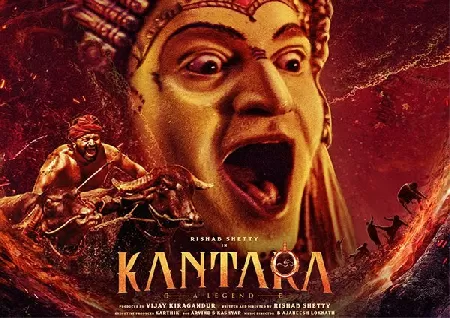Kantara movie review: Rishab Shetty's rendition of mythology is inventive and engrossing.

When you can't figure out who the enemy is within the first 10 minutes, you know you're watching a well-written film. While not revealing himself, the cunning enemy creates the appearance of distrust in the narrator. We won't know who the bad guy is or what their motivations are until we're engrossed in the film and attempting to untangle the tangles. The critical point is frequently close to the climax. This is the experience of viewing Rishab Shetty's newest film Kantara, a well-written, wonderfully photographed, and superbly executed cinematic experience.
Kantara's core storyline is a well-known one. The video is about indigenous peoples' rights to the land where they have lived for centuries. The aboriginal people are at odds with the government, which is attempting to control their way of life. Based on his wife's recommendation, a guy heads into the forest to collect some herbal roots that will prevent his hair from falling out.The forest officer, Muralidhar (Kishore), takes offence, smacks the villagers, and demands, "Do you believe this forest is your hereditary property?" The quick answer is yes. The villagers believe they have earned the right to enjoy everything the forest has to offer since they have been a part of its ecology for hundreds of years. The indigenous people are unable to grasp the cop's commands. "Who the heck is he to tell us all this?" they enquire.
Muralidhar is confused by this attitude of entitlement, while the inhabitants of the forest are perplexed by his influence over their lives.
Rishab's Shiva, the film's hero, comes from a long line of men who practise 'Bhoota Kola,' or spirit worship. He, on the other hand, is too distracted by life's temptations to maintain his family's history. He is fortunate to have a younger sibling who executes his Bhoota tasks with exceptional discipline and commitment. Shiva enjoys hunting wild boars, which are highly revered in their culture. He's shooting wild boars in part because they haunt him in his nightmares. To change and become the 'demi-god,' he must first subdue his inner demons.
Rishab, who also wrote and directed the film, tells the story of ignorance and misunderstanding in a colourful and aesthetically appealing way. This film is based on the mythology of Karnataka's Tulu Nadu area. He infuses each picture with sheer visceral intensity by presenting us to the wild, bright, and young vigour of the inhabitants of that region's lifestyle. The culture of Bhootaradhane lends a significant element of mystery and intrigue to the way we experience Kantara's narrative.
Arvind S. Kashyap's beautiful frames complement the very inventive audio rhythms made by B. Ajaneesh Loknath. Music is extremely important in the final 15 minutes of the film, complementing Rishab's powerful performance.
Related queries to this article
- Kantara movie review
- Kantara movie ratings
- Kantara movie explained
- Kantara movie story
- Rishab Shetty
- kannada movies
Read more articles and stories on InstaSity Entertainment.
